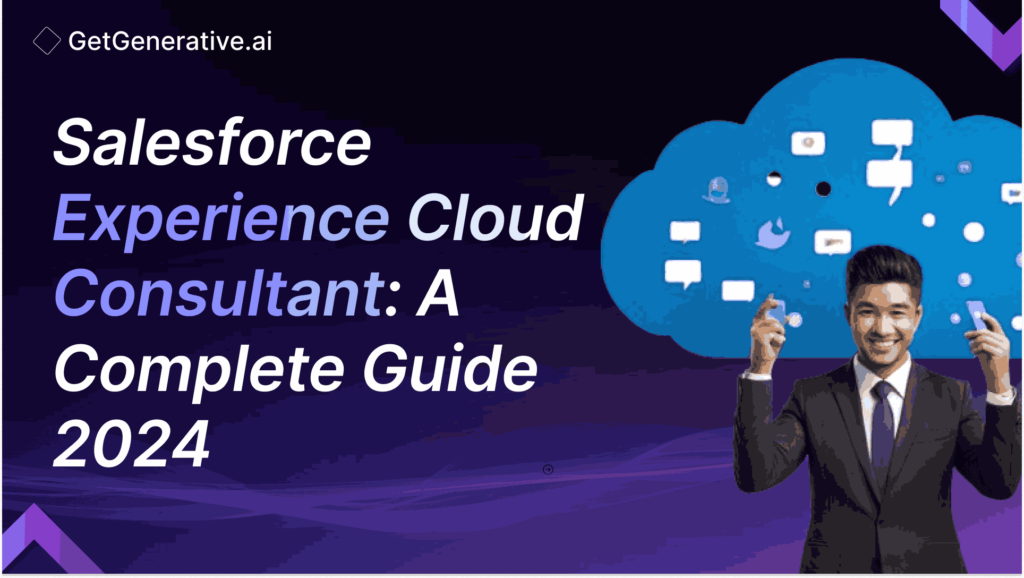Salesforce Experience Cloud Consultant: A Complete Guide 2024
This blog will delve into the role of an Experience Cloud Consultant in 2024, exploring the necessary skills, best practices, certifications, and latest trends in cloud technology.
What does an Experience Cloud Consultant do?
An Experience Cloud Consultant specializes in helping organizations implement and optimize Salesforce Experience Cloud. They work with clients to understand their unique needs, design custom solutions, and ensure successful deployment and adoption of the platform. Their responsibilities include:
- Analyzing business requirements and identifying key objectives.
- Configuring and customizing Salesforce Experience Cloud to meet client needs.
- Providing training and support to users.
- Ensuring data integrity and security.
- Collaborating with stakeholders to improve user experience and drive engagement.
How to Become an Experience Cloud Consultant?
Becoming an Experience Cloud Consultant involves a combination of education, experience, and certification. Here are the steps to embark on this career path:
- Education: A bachelor’s degree in computer science, information technology, or a related field is typically required.
- Salesforce Knowledge: Gain a thorough understanding of Salesforce products, particularly Experience Cloud.
- Experience: Work in roles such as Salesforce administrator, developer, or business analyst to build relevant experience.
- Certification: Obtain Salesforce Experience Cloud Consultant Certification to validate your expertise.
What skills are required for an experienced cloud consultant?
To excel as an Experience Cloud Consultant, a diverse set of technical and interpersonal skills is essential. These skills enable consultants to effectively analyze, design, implement, and support Salesforce Experience Cloud solutions. Here’s a more detailed look at the key skills required:
Technical Proficiency
- Salesforce Experience Cloud: In-depth knowledge of Salesforce Experience Cloud, including its features, functionalities, and integration capabilities.
- CRM Systems: Understanding Customer Relationship Management (CRM) principles and systems, as Salesforce Experience Cloud builds on these concepts.
- Web Development: Familiarity with web development languages such as HTML, CSS, JavaScript, and Apex (Salesforce’s proprietary language), as well as frameworks like Lightning Web Components (LWC).
- Data Management: Data modeling, database management, and migration skills are crucial for managing the data flow within the Experience Cloud.
- API Integration: Experience integrating Salesforce with other systems using REST/SOAP APIs, ensuring seamless data exchange and functionality.
Analytical Skills
- Business Analysis: Ability to analyze business processes, identify pain points, and understand user requirements to design effective solutions.
- Problem-Solving: Aptitude for diagnosing issues and developing practical solutions quickly and efficiently.
- Data Analysis: Proficiency in analyzing data to provide insights and drive decision-making processes.
Communication
- Verbal Communication: Strong verbal communication skills to articulate technical concepts clearly and effectively to non-technical stakeholders.
- Written Communication: Excellent written communication skills for creating documentation, reports, and user guides.
- Client Interaction: Ability to build and maintain positive relationships with clients, understand their needs, and provide tailored solutions.
Also Read – Salesforce CPQ Consultant: A Complete Guide
Project Management
- Project Planning: Experience in creating detailed project plans, including timelines, milestones, and resource allocation.
- Execution and Monitoring: Skills in executing project plans, monitoring progress, and adjusting as needed to ensure timely and successful completion.
- Agile Methodology: Familiarity with Agile project management techniques often used in Salesforce projects to enhance flexibility and responsiveness.
Problem-Solving
- Troubleshooting: Expertise in identifying the root cause of issues and implementing effective fixes.
- Critical Thinking: Ability to approach problems methodically, considering various angles and potential impacts before arriving at a solution.
- Adaptability: Flexibility to adapt solutions to changing business needs and technology updates.
Interpersonal Skills
- Team Collaboration: Experience working in collaborative environments, coordinating with different teams such as developers, marketers, and sales professionals.
- Empathy: Understanding and empathizing with end-users to design user-centric solutions that enhance their experience and satisfaction.
- Negotiation: Skills in negotiating with stakeholders to balance business requirements, user needs, and technical constraints.
Continuous Learning
- Keeping Updated: Commitment to staying current with the latest Salesforce updates, features, and best practices through continuous learning and professional development.
- Trailhead and Community Engagement: Active participation in Salesforce Trailhead modules, community forums, and user groups to stay informed and connected with industry trends and peers.
By mastering these skills, an Experience Cloud Consultant can effectively bridge the gap between business needs and technical solutions, ensuring successful Salesforce implementations that drive business growth and enhance customer experiences.
Best Practices in Experience Cloud Consulting
Successful Experience Cloud Consultants adhere to best practices to ensure optimal outcomes for their clients:
- Understand Client Needs: Conduct thorough needs assessments to tailor solutions.
- User-Centric Design: Focus on enhancing user experience and engagement.
- Continuous Learning: Stay updated with the latest Salesforce features and industry trends.
- Data Security: Implement robust security measures to protect sensitive information.
- Effective Training: Provide comprehensive training to ensure user adoption and satisfaction.
Also Read – Becoming a Salesforce Consultant – The Ultimate Guide
What certifications are needed for an experienced cloud consultant?
Certifications are crucial for demonstrating your expertise and credibility. Key certifications include:
- Salesforce Certified Experience Cloud Consultant: Validates your ability to implement Experience Cloud solutions.
- Salesforce Certified Administrator: Covers fundamental Salesforce administration skills.
- Salesforce Certified Advanced Administrator: For advanced administration capabilities.
- Salesforce Certified Platform App Builder: Focuses on building custom applications.
How does an Experience Cloud Consultant Differ from a Traditional IT Consultant?
While both roles involve technology consulting, an Experience Cloud Consultant focuses specifically on Salesforce Experience Cloud and its ecosystem. They possess deep expertise in Salesforce products and are dedicated to improving customer engagement and experience. In contrast, a traditional IT consultant may have a broader scope, covering various technologies and systems beyond Salesforce.
Is Certification Necessary to Become an Experience Cloud Consultant?
While certification is not strictly mandatory, it is highly recommended. Certifications formally recognize your skills and knowledge, making you more attractive to employers and clients. They also demonstrate your commitment to professional development and staying current with industry standards.
Conclusion
Salesforce Experience Cloud is vital in modernizing sales processes and enhancing customer engagement. As businesses adopt new technologies, the demand for skilled Experience Cloud Consultants will only grow. You can position yourself as a valuable asset in this dynamic field by acquiring the necessary skills, gaining relevant experience, and obtaining certifications.
Enhance your Salesforce consulting with GetGenerative.ai. Effortlessly craft outstanding proposals, enabling you to dedicate more time to providing exceptional client service.
Start today!
Frequently Asked Questions (FAQs)
1. What is Salesforce Experience Cloud?
Salesforce Experience Cloud is a platform that enables businesses to create connected digital experiences for their customers, partners, and employees.
2. How long does it take to become an Experience Cloud Consultant?
The timeline varies depending on your background and commitment, but it typically takes several years of education and experience and the time required to obtain certifications.
3. Can I become an Experience Cloud Consultant without a degree?
While a degree is beneficial, relevant experience and certifications can also prepare you to become an Experience Cloud Consultant.
4. What is the average salary of an Experience Cloud Consultant?
Salaries vary based on location, experience, and company size, but the average salary in the U.S. is around $90,000 to $120,000 per year.
5. Are there online courses available for learning Salesforce Experience Cloud?
Yes, many online courses and resources are available, including Salesforce’s own Trailhead platform, which offers a variety of learning modules and trails.




